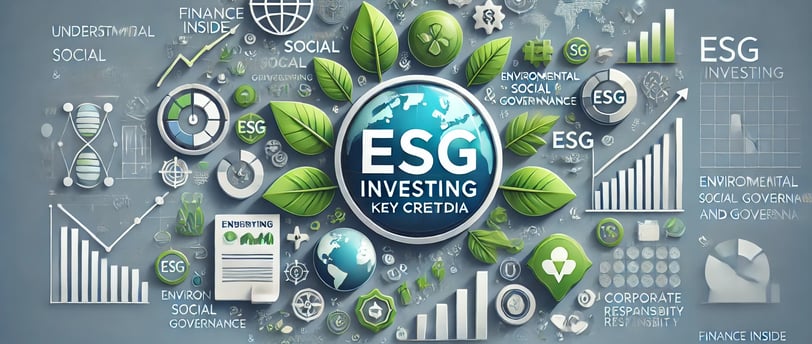Understanding ESG Investing: Key Criteria for Sustainable Success
Welcome back to Finance Inside, your trusted resource for in-depth financial insights and strategies. Today, we're delving into a topic that's transforming the investment landscape: ESG Investing. As environmental, social, and governance (ESG) considerations become increasingly central to investment decisions, understanding these key criteria is essential for investors seeking sustainable success. In recent years, ESG investing has evolved from a niche concern to a mainstream movement. Investors are no longer solely focused on financial returns; they're also considering the broader impact of their investments on society and the environment. This shift reflects a growing awareness that companies embracing sustainable and ethical practices are better positioned to thrive in the long term.
10/12/20241 min read


The Emergence of ESG Investing
The rise of ESG investing signifies a fundamental change in how we assess the value and potential of companies. It's about looking beyond traditional financial metrics to evaluate how a company's operations and policies align with values that promote sustainability, ethical behavior, and responsible management. This holistic approach acknowledges that environmental stewardship, social responsibility, and strong governance are integral to a company's performance and resilience.
Environmental, social, and governance factors provide a framework for evaluating companies on criteria that may not be immediately apparent in financial statements but are nonetheless critical to long-term success. By integrating ESG considerations into investment analysis, investors can identify risks and opportunities that traditional financial analysis might overlook.
Exploring the Core Components of ESG
Environmental Factors
Environmental criteria examine how a company's activities impact the natural world. This includes assessing resource usage, waste management, pollution control, and efforts to mitigate climate change. Companies are evaluated on their carbon footprint, energy efficiency, and adherence to environmental regulations.
For instance, a company actively reducing greenhouse gas emissions or investing in renewable energy sources demonstrates a commitment to environmental stewardship. Such initiatives not only contribute to the fight against climate change but can also lead to cost savings and innovation. Companies neglecting environmental responsibilities may face regulatory fines, cleanup costs, and reputational damage, all of which can negatively affect financial performance.
Social Factors
Social criteria focus on a company's relationships with its employees, suppliers, customers, and the communities where it operates. This dimension assesses how businesses manage social issues and contribute positively to society. Key considerations include labor practices, employee health and safety, diversity and inclusion, and community engagement.
A company fostering a positive workplace culture, supporting human rights, and investing in community development often enjoys enhanced reputation and customer loyalty. For example, businesses that offer fair wages, prioritize employee well-being, and implement ethical supply chain practices demonstrate strong social responsibility. These practices can lead to higher employee satisfaction, reduced turnover, and a more resilient brand image.
Governance Factors
Governance criteria evaluate the structures and processes that guide a company's operations and ensure accountability. Good governance practices are fundamental to a company's integrity and long-term success. This component examines aspects such as board composition, executive compensation, shareholder rights, transparency, and ethical conduct.
Companies with diverse and independent boards, transparent reporting, and robust risk management systems are considered to have strong governance. Effective governance reduces the risk of corporate scandals, fraud, and mismanagement. Investors view companies with solid governance frameworks as more reliable and better equipped to navigate challenges.
Why ESG Investing Matters
ESG investing isn't just about aligning investments with personal values; it's also a strategic approach to identifying companies poised for sustainable growth. Companies neglecting ESG issues may face regulatory fines, legal liabilities, or reputational damage. By considering ESG factors, investors can identify and avoid companies with high-risk profiles.
Studies have shown that companies with strong ESG practices often outperform their peers over the long term. Sustainable practices can lead to operational efficiencies, innovation, and access to new markets. Investors recognize that ESG factors can be indicators of management quality and future financial performance.
There's also a growing demand from institutional and individual investors for sustainable investment options. Asset managers incorporating ESG criteria are better positioned to attract capital from clients prioritizing ethical and sustainable considerations. Furthermore, governments and regulatory bodies are increasingly implementing policies that promote ESG disclosure and sustainability. Companies ahead of these trends may benefit from incentives and avoid penalties.
Integrating ESG Criteria into Investment Decisions
Incorporating ESG factors into investment analysis requires a thoughtful approach. Begin by gathering comprehensive data on companies' ESG practices. This may involve reviewing sustainability reports, regulatory filings, and third-party ESG ratings. Several organizations provide ESG scores and rankings, which can serve as valuable references.
Analyzing how companies address ESG issues relevant to their industry is crucial. Environmental concerns may be more significant for energy companies, while social factors could be paramount for consumer-facing businesses. Conducting a materiality assessment helps determine which ESG issues are most critical to a company's performance and risk profile.
Investors can also engage with companies to encourage better ESG practices. This may involve shareholder proposals, meetings with management, or participating in collaborative initiatives. Active engagement can lead to positive changes and enhance the value of investments.
When building an ESG-focused portfolio, consider a mix of companies demonstrating strong ESG performance and potential for improvement. Diversification remains important, but with an added layer of ESG considerations. Use ESG criteria to select investments that align with your values and financial objectives. This may involve excluding companies involved in activities contrary to your principles or focusing on those making positive contributions.
Regularly monitoring the ESG performance of your investments is essential. Stay informed about changes in company policies, industry trends, and regulatory developments. Transparent reporting on ESG outcomes helps maintain accountability and adjust strategies as needed.
Overcoming Challenges in ESG Investing
While ESG investing offers numerous benefits, it's essential to be aware of potential challenges. ESG data can be inconsistent or incomplete, making it difficult to compare companies accurately. Standardization of ESG reporting is improving but remains a work in progress. Investors may need to rely on multiple sources and exercise judgment in their analysis.
Some companies may portray themselves as more sustainable than they truly are, a practice known as greenwashing. Critical evaluation and due diligence are necessary to identify genuine ESG leaders. There may also be instances where ESG considerations conflict with financial performance. Investors must balance their commitment to ESG principles with their financial goals, recognizing that trade-offs might occur.
Additionally, ESG criteria and standards are continually evolving. Staying current with best practices and regulatory changes is crucial for effective ESG investing. By remaining adaptable and informed, investors can navigate these challenges and capitalize on opportunities.
The Future of ESG Investing
The momentum behind ESG investing shows no signs of slowing. As global challenges like climate change, social inequality, and corporate governance scandals continue to shape public discourse, ESG factors will likely become even more integral to investment decisions.
Advancements in technology and data analytics are enhancing the ability to assess ESG performance. Regulatory frameworks are increasingly mandating ESG disclosures, leading to greater transparency. Investors embracing ESG principles are not only contributing to positive societal outcomes but are also positioning themselves to capitalize on emerging opportunities.
Companies demonstrating resilience, innovation, and responsibility are better equipped to succeed in a rapidly changing world. By integrating ESG considerations, investors can play a part in fostering a more sustainable and equitable future while pursuing their investment goals.
Conclusion: Embracing ESG for Sustainable Investing
Understanding and integrating ESG criteria is becoming indispensable for investors seeking sustainable success. By considering environmental impact, social responsibility, and governance practices, investors can make more informed decisions that align with both their financial objectives and ethical values.
At Finance Inside, we're committed to empowering you with the knowledge and tools to navigate the evolving financial landscape confidently. ESG investing represents a significant shift toward more holistic and responsible investment practices. By staying informed and engaged, you can contribute to positive change and potentially enhance your investment returns.
Join us in embracing ESG investing for a sustainable and prosperous future.
If you found this exploration of ESG investing insightful, share it with fellow investors and subscribe to Finance Inside for more expert insights and strategies. Together, we can make a positive impact through informed investing.
The reference point for online finance and trading.
© 2024. All rights reserved.
Privacy Policy
Your privacy is important to us. Finance Inside is committed to protecting your personal information. When you subscribe to our newsletter or use our services, we collect personal information such as your name and email address to send you relevant content and updates about our services. This information will not be shared with third parties without your consent, except as required by law. We use advanced security measures to protect your data from unauthorized access.
Terms of Service.
Welcome to Finance Inside. By using our services, you agree to be bound by the following terms and conditions. The content and services provided by Finance Inside are intended for informational and educational purposes only and do not constitute financial advice or personalized investment recommendations. Finance Inside does not guarantee the accuracy, completeness, or reliability of the information provided. Users are responsible for their own financial decisions and any associated risks. Subscriptions to our services can be canceled at any time, with cancellations made at least 24 hours before renewal to avoid charges for the next period.
Disclaimer
The content provided by Finance Inside, including financial reports, eBooks, and other educational resources, is for informational and educational purposes only and does not constitute financial advice or personalized investment recommendations. Finance Inside does not guarantee the accuracy, completeness, or suitability of the information provided for any specific purpose.
The use of the information provided is at the sole discretion and risk of the user. Finance Inside will not be responsible for any losses or damages resulting from the use of the information provided in financial reports, eBooks, or other content.
Users are encouraged to consult a qualified financial advisor before making investment decisions.


Follow us on
